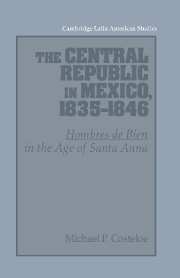Book contents
- Frontmatter
- Contents
- Preface
- Acknowledgements
- 1 An introduction: change and continuity in the Age of Santa Anna
- 2 The end of federalism
- 3 The transition to centralism: stage I
- 4 The transition to centralism: stage II
- 5 Las Siete Leyes
- 6 Anastasio Bustamante and the centralist republic, 1837–1839
- 7 Santa Anna versus Bustamante: the end of the Siete Leyes, 1839–1841
- 8 ‘La dictadura disfrazada con el hermoso nombre de regeneración política’
- 9 Santa Anna and the Bases Orgánicas
- 10 ‘La revolución de tres horas’
- 11 Herrera and the rise of Paredes y Arrillaga
- 12 Hombres de bien and the restoration of federalism
- 13 Conclusion
- Sources and works cited
- Index
- CAMBRIDGE LATIN AMERICAN STUDIES
3 - The transition to centralism: stage I
Published online by Cambridge University Press: 23 October 2009
- Frontmatter
- Contents
- Preface
- Acknowledgements
- 1 An introduction: change and continuity in the Age of Santa Anna
- 2 The end of federalism
- 3 The transition to centralism: stage I
- 4 The transition to centralism: stage II
- 5 Las Siete Leyes
- 6 Anastasio Bustamante and the centralist republic, 1837–1839
- 7 Santa Anna versus Bustamante: the end of the Siete Leyes, 1839–1841
- 8 ‘La dictadura disfrazada con el hermoso nombre de regeneración política’
- 9 Santa Anna and the Bases Orgánicas
- 10 ‘La revolución de tres horas’
- 11 Herrera and the rise of Paredes y Arrillaga
- 12 Hombres de bien and the restoration of federalism
- 13 Conclusion
- Sources and works cited
- Index
- CAMBRIDGE LATIN AMERICAN STUDIES
Summary
When the newly elected deputies and senators began to assemble in Mexico City for their preparatory sessions beginning on 14 December 1834, the first problem they encountered was the condition of their respective chambers, which had been closed since the previous May. Thieves had removed lead from the roof, rain had poured in and, with the carpets ruined and rotting papers scattered about the floors, there was an atmosphere of dampness and decay. Santa Anna's apparent hostility to constitutional reform had deterred many from travelling to the capital, and by the beginning of January, the Chamber of Deputies was barely quorate and the Senate still inquorate. Within a few days, more representatives had arrived, and Santa Anna duly performed the opening ceremony on 4 January 1835. In his address, he adopted the mantle of statesman and patriot, and in what was becoming his archetypal hyperbolic and bombastic style, he proclaimed that his government had conquered the ‘monster that is anarchy’. Extremists – ‘men without morals’ – had attacked the fundamental beliefs of the people, rooted in three centuries of tradition, but they had been soundly defeated. Their factions had been suppressed, their laws suspended or repealed, bishops had returned to their flocks and priests to their parishes. The doors had been closed forever to political fanaticism, and his government, having steadied the faltering ship of state, had opened the way to reason and progress.
- Type
- Chapter
- Information
- The Central Republic in Mexico, 1835–1846'Hombres de Bien' in the Age of Santa Anna, pp. 46 - 65Publisher: Cambridge University PressPrint publication year: 1993



